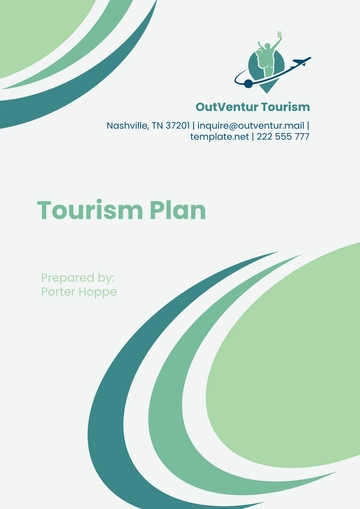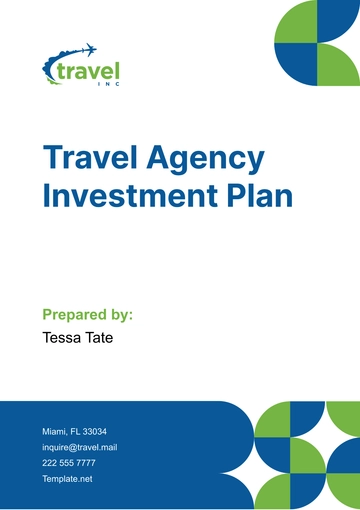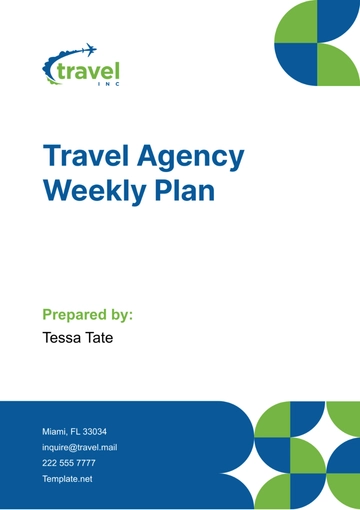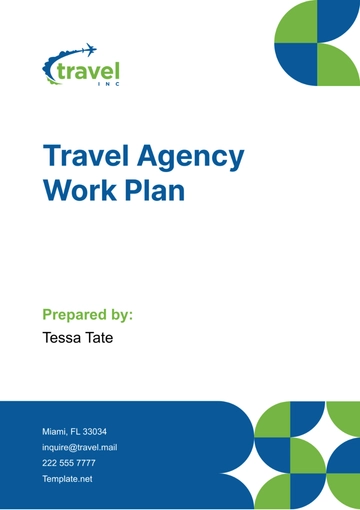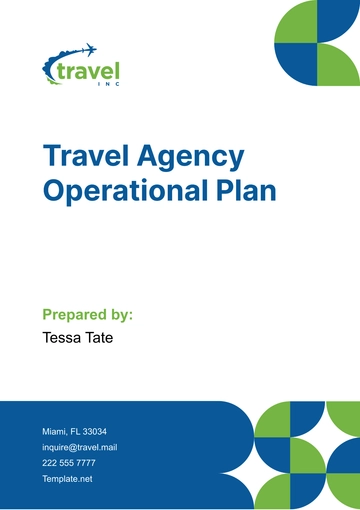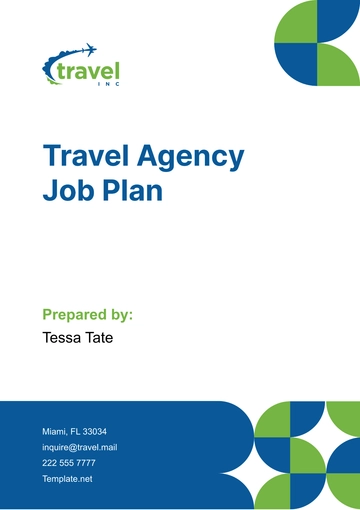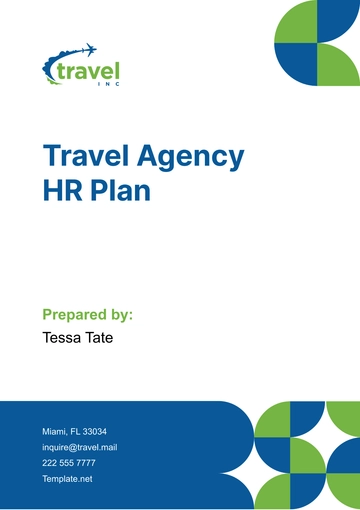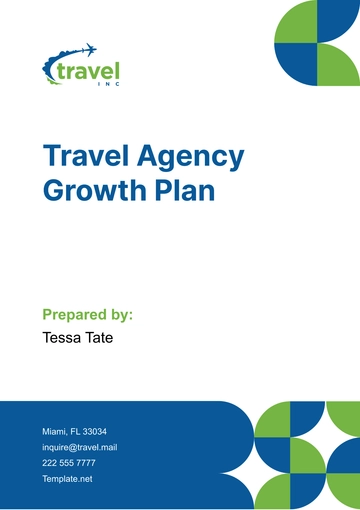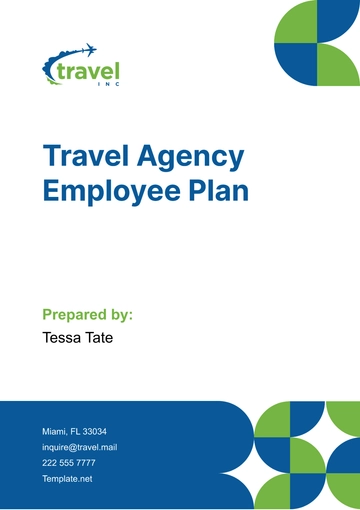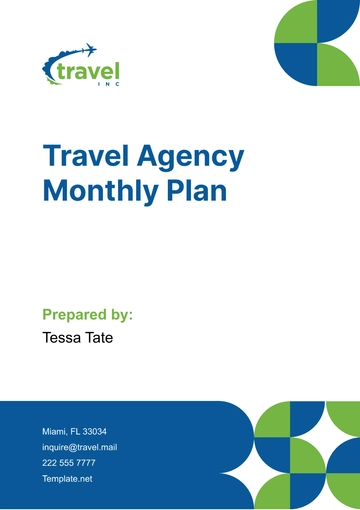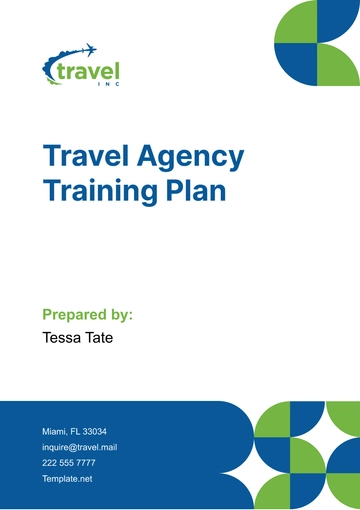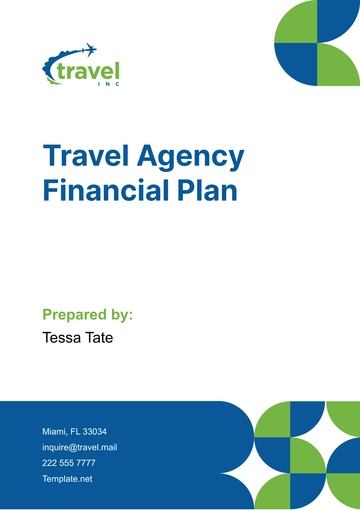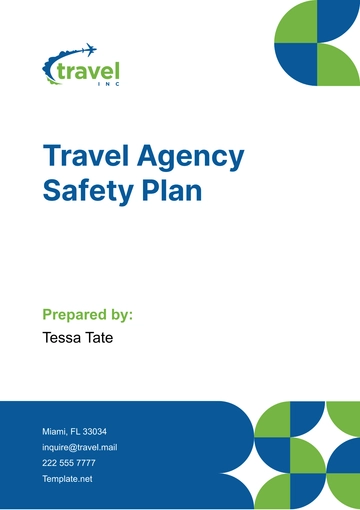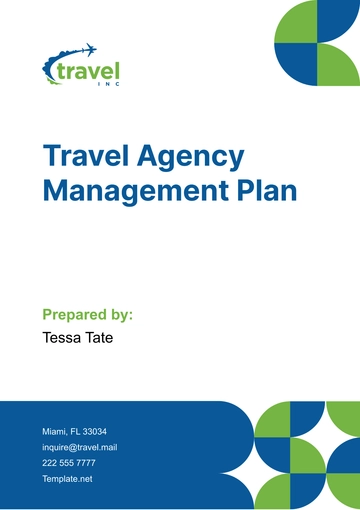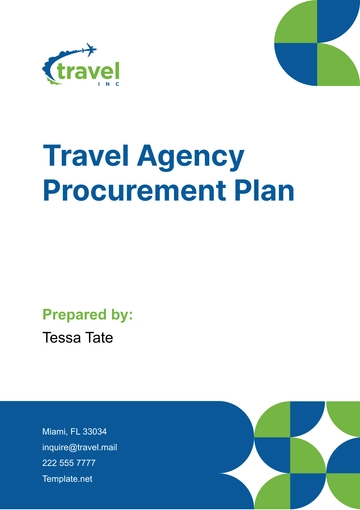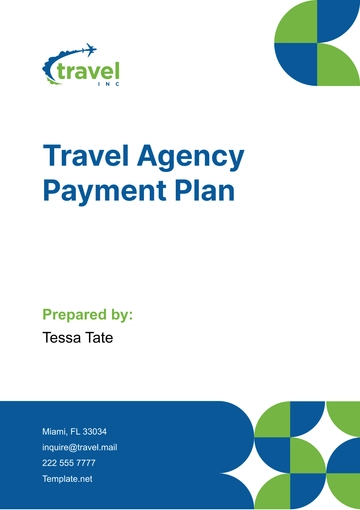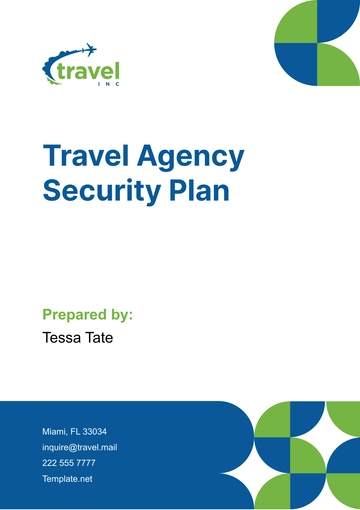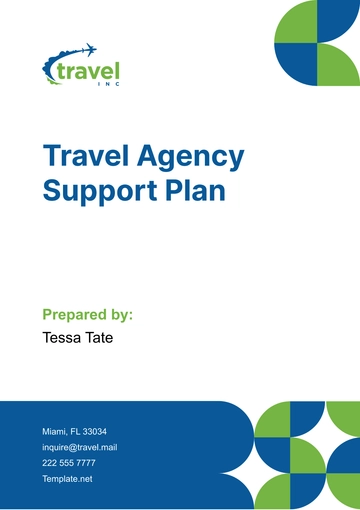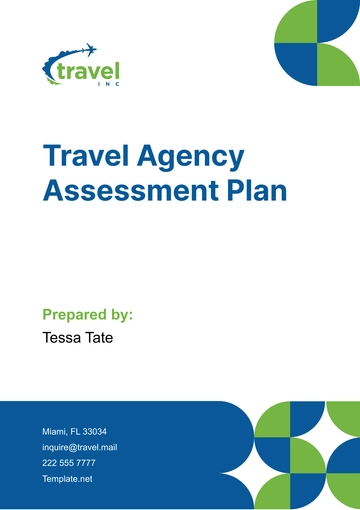Free Travel Agency Procurement Plan
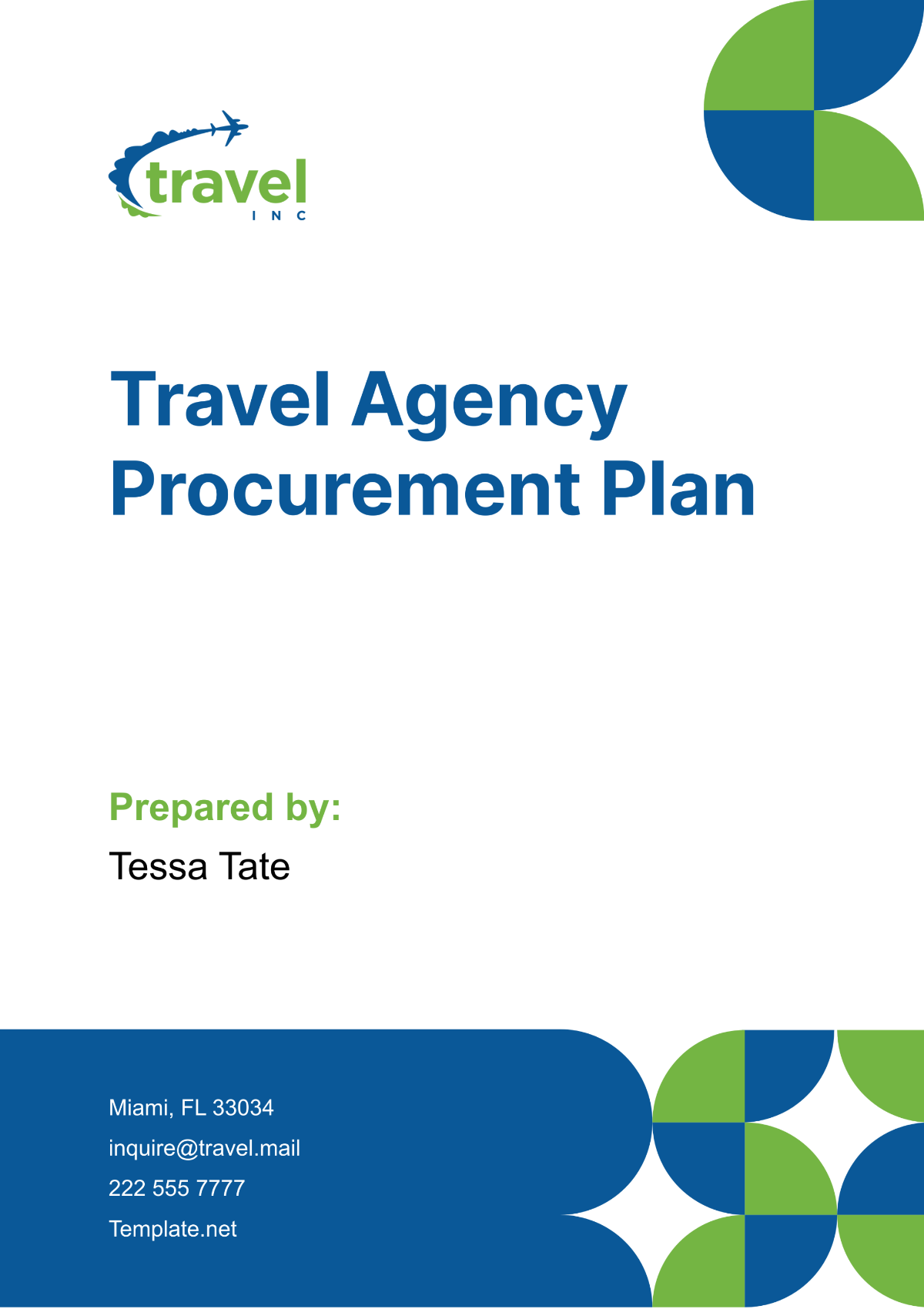
I. Introduction
This Travel Agency Procurement Plan outlines the strategies and procedures that [Your Company Name] will implement to procure goods and services necessary for its operations. As a leading travel agency committed to delivering exceptional service to our clients, efficient procurement practices are essential to ensure the quality, reliability, and cost-effectiveness of the resources we utilize. This plan serves as a roadmap for identifying needs, selecting suppliers, managing costs, and mitigating risks in the procurement process.
II. Identification of Needs
As a leading travel agency dedicated to providing exceptional travel experiences, [Your Company Name] recognizes the importance of identifying and fulfilling the diverse needs of our clients and internal operations. The following categories represent key areas where procurement is essential to support our operations:
Transportation Services: [Your Company Name] offers a wide range of transportation options to accommodate the diverse travel preferences of our clients. This includes airline tickets for domestic and international flights, as well as ground transportation services such as car rentals, airport transfers, and chauffeur services. We prioritize safety, reliability, and convenience when selecting transportation providers to ensure seamless travel experiences for our clients.
Accommodation: We understand that comfortable and convenient accommodation is crucial to the overall travel experience. [Your Company Name] partners with a variety of hotels, resorts, and vacation rental properties to offer our clients a range of accommodation options to suit their preferences and budgets. From boutique hotels to luxury resorts, we strive to provide accommodations that meet the highest standards of comfort, cleanliness, and hospitality.
Technology: In today's digital age, technology plays a critical role in every aspect of the travel industry. [Your Company Name] relies on a variety of technology solutions to streamline our operations, enhance communication with clients, and deliver personalized travel services. This includes software solutions for booking and reservation management, customer relationship management (CRM) systems, website and mobile app development, and communication tools such as email and messaging platforms.
Office Supplies: Efficient office operations are essential to supporting our team in delivering outstanding service to our clients. [Your Company Name] requires a variety of office supplies and equipment to facilitate day-to-day operations, including stationery, printer cartridges, office furniture, and IT equipment such as computers, printers, and scanners.
Marketing and Advertising: Effective marketing and advertising are essential for attracting new clients and promoting our services to existing ones. [Your Company Name] invests in a range of marketing and advertising activities, including print and digital advertising, social media marketing, email campaigns, and promotional materials such as brochures, flyers, and banners.
Training and Development: We believe in investing in the professional development of our team to ensure they have the skills and knowledge needed to deliver exceptional service to our clients. [Your Company Name] provides a variety of training and development opportunities, including industry certifications, workshops, seminars, and online learning resources.
Insurance: Travel insurance provides peace of mind for our clients and protects them against unforeseen circumstances such as trip cancellations, medical emergencies, and lost luggage. [Your Company Name] partners with reputable insurance providers to offer comprehensive travel insurance policies that meet the needs of our clients and provide them with the confidence to travel safely and confidently.
III. Supplier Identification
Once our needs are identified, we will conduct thorough research to identify potential suppliers capable of meeting our requirements. This process will involve:
Market Research: Analyzing the market to identify reputable suppliers with a track record of delivering quality goods and services.
Vendor Evaluation: Assessing potential vendors based on criteria such as reliability, quality, cost, and compatibility with our needs.
Supplier Relationships: Building and maintaining relationships with selected suppliers to ensure ongoing collaboration and mutual benefit.
The following table provides an overview of potential suppliers identified for key procurement categories:
Procurement Category | Potential Suppliers |
|---|---|
Transportation | Airlines, ground transporters |
Accommodation | Hotel chains, booking platforms |
Technology | Software providers, IT vendors |
Office Supplies | Stationery suppliers, equipment vendors |
Marketing | Advertising agencies, digital marketing firms |
Training | Training institutes, online learning platforms |
Insurance | Insurance companies, brokers |
IV. Procurement Methods
[Your Company Name] employs a variety of procurement methods to acquire the goods and services necessary to support our operations and deliver exceptional travel experiences to our clients. These methods are chosen based on factors such as the nature of the procurement, the level of competition in the market, and the desired outcomes of the procurement process. The following are the primary procurement methods utilized by [Your Company Name]:
Competitive Bidding: For large-scale procurement projects or contracts where multiple suppliers can meet our requirements, [Your Company Name] utilizes competitive bidding. This process involves issuing requests for proposals (RFPs) or requests for quotations (RFQs) to a select group of suppliers, who then submit competitive bids outlining their proposed solutions, pricing, and terms. Competitive bidding allows us to assess and compare proposals from different suppliers and select the most cost-effective and advantageous offer.
Request for Proposals (RFPs): When procuring specialized services or complex projects that require detailed specifications and a thorough evaluation process, [Your Company Name] utilizes the request for proposals (RFP) method. RFPs are comprehensive documents that outline our requirements, expectations, evaluation criteria, and terms and conditions. Suppliers are invited to submit proposals detailing their approach to meeting our needs, including technical solutions, pricing, qualifications, and references. The RFP process enables us to evaluate proposals holistically and select the supplier that best meets our criteria.
Negotiation: In certain procurement situations, such as contract renewals, customization of services, or unique requirements, [Your Company Name] engages in direct negotiations with suppliers to reach mutually agreeable terms and conditions. Negotiation allows us to discuss specific aspects of the procurement, such as pricing, delivery schedules, service levels, and contractual terms, and tailor the agreement to meet our specific needs. Through effective negotiation, we aim to achieve favorable outcomes while maintaining positive relationships with our suppliers.
Preferred Supplier Contracts: [Your Company Name] establishes strategic partnerships with preferred suppliers who consistently demonstrate reliability, quality, and value. These preferred supplier relationships are based on mutual trust, transparency, and collaboration, and are formalized through long-term contracts or agreements. By consolidating our procurement activities with preferred suppliers, we streamline processes, leverage economies of scale, and negotiate favorable terms and pricing. Preferred supplier contracts enable us to maintain consistency, quality, and efficiency in our procurement operations while fostering strong partnerships that benefit both parties.
V. Budgeting and Financial Considerations
Effective budgeting is critical to managing costs and optimizing resources in the procurement process. [Your Company Name] will allocate budgets for each procurement category based on historical data, market trends, and anticipated needs. Financial considerations include:
Budget Allocation: Allocating funds for each procurement category based on priority and projected expenditure.
Cost Management: Implementing cost-saving measures such as bulk purchasing, negotiation, and supplier consolidation.
Financial Reporting: Regularly monitoring and reporting on procurement expenditures to ensure adherence to budgetary constraints and financial goals.
The following table illustrates the budget allocation for key procurement categories for the upcoming fiscal year:
Procurement Category | Budget Allocation (USD) |
|---|---|
Transportation | $200,000 |
Accommodation | $300,000 |
Technology | $150,000 |
Office Supplies | $50,000 |
Marketing | $100,000 |
Training | $50,000 |
Insurance | $75,000 |
VI. Risk Management
[Your Company Name] recognizes the importance of mitigating risks associated with procurement activities to ensure continuity of operations and minimize disruptions. Key elements of our risk management strategy include:
Supplier Risk Assessment: Conducting ongoing assessments of supplier reliability, financial stability, and performance.
Contract Management: Establishing clear contract terms and conditions to minimize legal and contractual risks.
Contingency Planning: Developing contingency plans to address potential disruptions in the supply chain, such as supplier bankruptcies or natural disasters.
Compliance: Ensuring compliance with relevant laws, regulations, and industry standards to mitigate legal and regulatory risks.
VII. Compliance and Legal Considerations
[Your Company Name] is committed to conducting procurement activities in compliance with applicable laws, regulations, and ethical standards. We recognize the importance of maintaining integrity, transparency, and fairness in our procurement processes to uphold our reputation as a trusted provider in the travel industry. The following are key compliance and legal considerations that guide our procurement practices:
Legal Review: Prior to finalizing contracts or agreements with suppliers, we conduct comprehensive legal reviews. These reviews, often conducted in collaboration with legal counsel, ensure that our procurement activities comply with relevant laws, regulations, and contractual obligations.
Ethical Sourcing: Ethical sourcing is a core value at [Your Company Name]. We are committed to partnering with suppliers who demonstrate responsible business practices, including compliance with labor laws, environmental regulations, and ethical sourcing standards.
Data Protection: Protecting sensitive data collected during procurement activities is paramount to [Your Company Name]. We comply with data protection regulations, such as the General Data Protection Regulation (GDPR), to ensure the confidentiality, integrity, and security of personal and confidential information. Through measures such as encryption, access controls, data minimization, and secure storage, we safeguard sensitive data from unauthorized access, disclosure, or misuse.
Compliance Training: [Your Company Name] provides comprehensive compliance training to employees involved in procurement activities. These training programs cover a range of topics, including anti-corruption laws, conflict of interest policies, data protection regulations, and ethical sourcing practices.
Supplier Due Diligence: [Your Company Name] conducts due diligence on potential suppliers to assess their compliance with legal and ethical standards. This process includes evaluating suppliers' compliance history, financial stability, reputation, and adherence to industry standards and best practices. Suppliers who fail to meet our compliance requirements may be disqualified from consideration or subject to additional scrutiny and monitoring.
VIII. Monitoring and Evaluation
Continuous monitoring and evaluation are essential to assess the effectiveness of our procurement processes and identify areas for improvement. [Your Company Name] will employ the following measures:
Performance Reviews: Conducting regular performance reviews of suppliers to assess their adherence to contractual obligations and service level agreements.
Feedback Mechanisms: Soliciting feedback from internal stakeholders and clients to evaluate supplier performance and satisfaction with procured goods and services.
Process Improvement: Implementing process improvements based on feedback and performance data to enhance efficiency and effectiveness.
IX. Conclusion
This Travel Agency Procurement Plan outlines [Your Company Name]'s commitment to efficient and effective procurement practices to support our operations and deliver exceptional travel experiences to our clients. By identifying needs, selecting reputable suppliers, managing costs, mitigating risks, ensuring compliance, and continuously monitoring and evaluating our procurement processes, we will achieve our strategic objectives and uphold our reputation as a trusted provider in the travel industry.
- 100% Customizable, free editor
- Access 1 Million+ Templates, photo’s & graphics
- Download or share as a template
- Click and replace photos, graphics, text, backgrounds
- Resize, crop, AI write & more
- Access advanced editor
Ensure smooth operations with Template.net's Travel Agency Procurement Plan Template. Editable in our AI Editor Tool, this customizable template provides a structured format for outlining procurement processes, timelines, and budget allocations for acquiring goods and services essential to your agency's operations. Enhance efficiency, minimize risks, and optimize resource utilization with this user-friendly tool!
You may also like
- Finance Plan
- Construction Plan
- Sales Plan
- Development Plan
- Career Plan
- Budget Plan
- HR Plan
- Education Plan
- Transition Plan
- Work Plan
- Training Plan
- Communication Plan
- Operation Plan
- Health And Safety Plan
- Strategy Plan
- Professional Development Plan
- Advertising Plan
- Risk Management Plan
- Restaurant Plan
- School Plan
- Nursing Home Patient Care Plan
- Nursing Care Plan
- Plan Event
- Startup Plan
- Social Media Plan
- Staffing Plan
- Annual Plan
- Content Plan
- Payment Plan
- Implementation Plan
- Hotel Plan
- Workout Plan
- Accounting Plan
- Campaign Plan
- Essay Plan
- 30 60 90 Day Plan
- Research Plan
- Recruitment Plan
- 90 Day Plan
- Quarterly Plan
- Emergency Plan
- 5 Year Plan
- Gym Plan
- Personal Plan
- IT and Software Plan
- Treatment Plan
- Real Estate Plan
- Law Firm Plan
- Healthcare Plan
- Improvement Plan
- Media Plan
- 5 Year Business Plan
- Learning Plan
- Marketing Campaign Plan
- Travel Agency Plan
- Cleaning Services Plan
- Interior Design Plan
- Performance Plan
- PR Plan
- Birth Plan
- Life Plan
- SEO Plan
- Disaster Recovery Plan
- Continuity Plan
- Launch Plan
- Legal Plan
- Behavior Plan
- Performance Improvement Plan
- Salon Plan
- Security Plan
- Security Management Plan
- Employee Development Plan
- Quality Plan
- Service Improvement Plan
- Growth Plan
- Incident Response Plan
- Basketball Plan
- Emergency Action Plan
- Product Launch Plan
- Spa Plan
- Employee Training Plan
- Data Analysis Plan
- Employee Action Plan
- Territory Plan
- Audit Plan
- Classroom Plan
- Activity Plan
- Parenting Plan
- Care Plan
- Project Execution Plan
- Exercise Plan
- Internship Plan
- Software Development Plan
- Continuous Improvement Plan
- Leave Plan
- 90 Day Sales Plan
- Advertising Agency Plan
- Employee Transition Plan
- Smart Action Plan
- Workplace Safety Plan
- Behavior Change Plan
- Contingency Plan
- Continuity of Operations Plan
- Health Plan
- Quality Control Plan
- Self Plan
- Sports Development Plan
- Change Management Plan
- Ecommerce Plan
- Personal Financial Plan
- Process Improvement Plan
- 30-60-90 Day Sales Plan
- Crisis Management Plan
- Engagement Plan
- Execution Plan
- Pandemic Plan
- Quality Assurance Plan
- Service Continuity Plan
- Agile Project Plan
- Fundraising Plan
- Job Transition Plan
- Asset Maintenance Plan
- Maintenance Plan
- Software Test Plan
- Staff Training and Development Plan
- 3 Year Plan
- Brand Activation Plan
- Release Plan
- Resource Plan
- Risk Mitigation Plan
- Teacher Plan
- 30 60 90 Day Plan for New Manager
- Food Safety Plan
- Food Truck Plan
- Hiring Plan
- Quality Management Plan
- Wellness Plan
- Behavior Intervention Plan
- Bonus Plan
- Investment Plan
- Maternity Leave Plan
- Pandemic Response Plan
- Succession Planning
- Coaching Plan
- Configuration Management Plan
- Remote Work Plan
- Self Care Plan
- Teaching Plan
- 100-Day Plan
- HACCP Plan
- Student Plan
- Sustainability Plan
- 30 60 90 Day Plan for Interview
- Access Plan
- Site Specific Safety Plan
